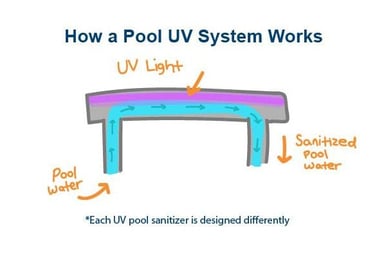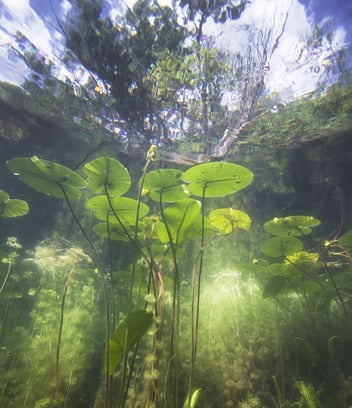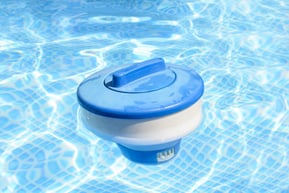Swimming Pool Sanitizers: The 7 Best Options to Consider (Pros/Cons)
September 18th, 2019
9 min read
By Jason Hughes
.jpg?width=988&height=559&name=pool-sanitation-methods%20(1).jpg)
A swimming pool is quite unlike anything else that you may ever own.
If you don’t clean your house, you can still live in it. If you don’t clean your car, you can still drive it.
But if you don’t clean your pool, you can’t swim in it. At least you really shouldn’t.
Cleaning is an essential part of maintaining your swimming pool and, unfortunately, keeping leaves out is only half the job.
There are also invisible pathogens and parasites that can make swimming in your pool unsafe. So how do you keep them out?
The answer is simple: To keep your pool safe for swimming, you’re going to have to use at least one pool sanitizer.
At River Pools, we specialize in fiberglass pools. Having been in the pool industry for years, we've seen many sanitation methods in action and know how they work with the various inground pool types.
In this guide, we’re going to introduce seven pool sanitation options and give a brief overview of how they work so that you can decide which is right for your swimming pool.
Let’s jump in.
What is a Pool Sanitizer?
A pool sanitizer cleans and sanitizes the swimming pool’s water and makes it safe for swimming. It does this by eliminating harmful pathogens that can cause illness for swimmers. As an added bonus, pool sanitizers also help to keep algae at bay.
As you may already know, chlorine is the most popular pool sanitizer, but there are a host of other sanitation methods that you can use to keep your pool clean.
Before we get into these various methods, let's talk about pool chlorine and explain why it is so popular and effective for sanitizing pool water.
#1 Pool Chlorine
Even though pool chlorine is not typically actual chlorine (chemically speaking), for the sake of simplicity, we'll refer to chlorine products simply as pool chlorine.
Pool chlorine is also known as hypochlorous acid, and it inactivates and kills pathogens like E. Coli. In addition, it chemically destroys materials from swimmers and the environment to make the water safer for swimming. Like other sanitizers, chlorine is also great for keeping algae out of your pool.
If you want to learn more about how pool chlorine works and get deeper into the details of its chemistry, click here.
If you're not that into science and you mostly want to know what your options are when adding chlorine to your pool, we've got you covered.
Pool chlorine comes in several forms, including:
- Pool chlorine tablets: Chlorine tablets dissolve in your pool's water and come in a few sizes (usually 3” and 1”). These are placed in the skimmer basket or dispensed with a floating chlorine dispenser. If you have an automatic chlorinator installed, you will use that to dissolve the tablets.
- Pool chlorine powder (granular chlorine): Chlorine powder is added directly to the pool water from the package according to the amount your pool requires, which is based on the results of your chemical tests. Granular chlorine works faster than tablets as tablets can be slow to dissolve.
- Pool chlorine liquid: Pool chlorine liquid is added directly to the pool water. It’s also fast-acting and offers an even quicker way to sanitize your pool. Liquid chlorine won't last very long on your shelf or in your shed though, so you'll need to use it soon after buying it. Chlorine granules and tablets have a longer shelf life overall, which is one of the reasons they are so popular.
- Pool chlorine gas: This is the only true form of pure chlorine that is used to sanitize swimming pools. Because it can be dangerous if mishandled, only qualified organizations and individuals are allowed to handle gas chlorine for pools. It also isn’t the most common sanitation method for residential pools, although it is very effective.
Floating chlorine dispenser
Saltwater Chlorinators
Saltwater chlorinators turn salt into chlorine using a specialized generator. Cool, right? To turn salt into chlorine, all you would have to do as a pool owner is pour the required amount of salt into your pool (unless you have a brine-tank system) and let the generator do the work.
One thing to note is that these types of systems don't do very well with vinyl liner pools that have metal walls. The salt corrodes the metal and causes major problems with the pool's structure over time.
Salt can also be abrasive to plaster finishes in concrete pools, causing it to wear down faster (and resurfacing your concrete pool can cost between 10-20k). Fiberglass pools, on the other hand, do great with saltwater systems and may be the better choice if you want to use a salt chlorine generator. Check out our review of some top pool salt water systems on the market today.
Pool Chlorine Pros and Cons
To summarize the benefits and drawbacks of using chlorine in your swimming pool, here is a quick list of pros and cons:
Pros
- Readily available
- Effectively kills or inactivates pathogens and algae
- Multiple use options (tablets, granules, liquid, gas, etc.)
- Oxidizes materials in the water (translation: it destroys contaminants)
- Works in indoor and outdoor pools
- Works with all three pool types (with the exception of salt systems)
- Maintains a residual concentration in the water
Cons
- Can leave a strong smell
- May cause eye or skin irritation
- Salt chlorine systems can wear down vinyl liner and concrete pools
- Can bleach vinyl liners if there is prolonged contact (granules at bottom of pool, etc.)
- Chlorine products sometimes contain other ingredients that dilute the amount of available chlorine content
#2 Pool Bromine
Bromine works a lot like chlorine (they belong to the same chemical family), but it’s a bit more expensive to use as a pool sanitizer. We're talking only a few dollars more, but those few extra dollars can add up to hundreds or even thousands over the lifetime of your pool.
The key difference between bromine and chlorine is that bromine doesn't smell as strongly and it it tends to be less irritating to eyes. Chlorine is also a better oxidizer than bromine, meaning it's better at changing the chemical structure of contaminants in the water.
Bromine is more commonly used to sanitize hot tubs and spas because it’s more stable than chlorine in warmer water, but it can definitely be used in regular swimming pools as well.
Bromine is a liquid in its original state, but it typically comes in tablets or granules. If you’re looking for other pool sanitation options because you have a chlorine allergy, bromine is not a great alternative, because it contains chlorine.
Keep in mind that bromine is less stable in sunlight and doesn’t do as well in outdoor pools as it does in indoor pools.
Pool Bromine Pros and Cons
Pros
- Does not give off a strong smell
- Gentler on the eyes than chlorine
- Effective disinfectant and algicide
- Great for sanitizing spas and hot tubs
- Works with all three pool types
Cons
- More expensive than chlorine
- Less oxidation power than chlorine
- Not suitable for those with chlorine allergy
- Does not work as well when exposed to sunlight (generally works better in indoor pools)
#3 UV Pool System

UV pool sanitation systems are an almost chemical-free way to keep your swimming pool clean. The UV light works as a germicide to eliminate harmful microorganisms in the pool water as it goes through the filtration system.
This means that you aren’t directly exposed to the UV light and don't have to worry about the dangers associated with it.
While UV systems are effective at eliminating pathogens, there are some drawbacks to consider. To start, it's not 100% chemical-free. Since the UV light only sanitizes the water as it passes through the filtration system, your pool will require additional chemicals to keep it clean before and after it is sanitized by the UV light.
Want to learn more about UV pool systems? Read our full guide which covers cost, pros, and cons here.
Pool UV System Pros and Cons
Pros
- Reduces chemical consumption
- Effective at inactivating parasites and other pathogens
- Safely disinfects water away from swimmers
- Low maintenance
- Generated on-site (no refills or frequent trips to the store)
- UV lamps can last a long time (from 4,000-9,000 hours)
Cons
- Not effective on its own (requires use of chemicals)
- Acts only as a supplemental oxidizer and disinfectant
- The UV light becomes less effective over time and will need to be replaced
#4 Ozone Pool System
Pool ozone is a gas (the same stuff that protects us from the sun), and it is generated on-site using an Ozonator, or ozone generator. Ozone generators split and reassemble oxygen molecules to form ozone in various ways. Currently, this is done by one of two methods: corona discharge or ultraviolet light.
Corona discharge ozone systems produce a higher concentration of ozone, but they can also be more expensive to buy and install. However, in the long-run, they are the more cost-effective option because they cost less per gram of produced ozone than UV ozone generators.
The generator connects to the pool’s circulation system and sanitizes the water as it filters through. Ozone kills and inactivates bacteria, viruses, and parasites within the system, but once the water is returned to the pool, ozone is only present at a very low and safe concentration.
Because of this low concentration, another disinfectant (usually chlorine) is typically needed as well to ensure the pool is fully sanitized.
Pool ozone is considered a supplemental disinfectant since it does not continue to disinfect the pool water once it passes through the system. In this way, it is similar to a pool UV system.
Pool Ozone System Pros and Cons
Pros
- Safe pool sanitation method
- Ozone is generated on-site (no trips to the store)
- Effective at inactivating parasites and other pathogens
- Effective oxidizer
- Can be used on indoor and outdoor pools
Cons
- Only considered a supplemental oxidizer and disinfectant
- Requires residual disinfectant
#5 Pool Ionizer
A swimming pool ionizer releases heavy metal ions, like copper and silver, into the pool water to kill bacteria and algae. It’s a slow-acting process, and it’s not sufficient enough to work as a stand-alone sanitizer. If you use an ionizer, you will still need chemical sanitizers, like chlorine, to shock your pool when necessary.
Keep in mind that this method can lead to staining if you don’t take proper care of your pool and manage the water chemistry.
Interested in learning more about this method? Read more about pool ionizers here.
Pool Ionizer Pros and Cons
Pros
- Reduces chemical usage
- Effective at eliminating pathogens from the water
- Keeps algae at bay
- Works with indoor and outdoor pools
Cons
- The larger the pool, the longer it can take to work
- Acts as a supplemental sanitizer (will still require chemicals for regular shocking)
- Can stain your swimming pool
- Ineffective oxidizer
#6 Pool Hydrogen Peroxide (Like Baquacil)
Alternatively, you could use hydrogen peroxide in place of chlorine. This method works best with outdoor pools as it requires sunlight (or otherwise artificial UV light) to create the chemical reaction that destroys bacteria in pool water. In general, this is a good option for anyone who is allergic to or wants to avoid chlorine, but it does have less disinfecting power.
Caution: hydrogen peroxide as a pool sanitizer is not compatible with DE filters.
Pool Hydrogen Peroxide Pros and Cons
Pros
- Good alternative to chlorine
- Works well with outdoor pools
- Powerful oxidizer
- Effective as an algicide
Cons
- Less disinfecting power than chlorine
- requires sunlight or UV light to work effectively (not always a good option for indoor pools)
- Not compatible with DE filters
#7 Natural Pool System
 If you want to have a truly chemical-free pool, a natural pool system may work for you. That is, as long as you don’t mind having plants, rocks, and sometimes wildlife in your pool.
If you want to have a truly chemical-free pool, a natural pool system may work for you. That is, as long as you don’t mind having plants, rocks, and sometimes wildlife in your pool.
This type of system relies on the pool biofilter, a zone of rocks and aquatic plants that regenerate the water and clear it of impurities. This is the same purification system that is often found in nature.
These pools need a lot of space to operate, and you’re going to have to spend time tending your underwater garden. In short, this is unlike most swimming pool sanitation methods and will take some adapting.
Interested in building a natural pool or switching your inground pool to a biofilter system? Learn more about natural pools here.
Natural Pool System Pros and Cons
Pros
- Chemical-free purification
- Aesthetically pleasing
- Eco-friendly
- Blends in with nature
Cons
- Requires double the space
- Attracts wildlife
- Requires working with plants
- May have a green or brown tint
What is the best pool sanitation system?
While we can’t say across the board which method is best (every pool and every pool owner is different), we can say that most pools use some type of chlorine as the main sanitation method. Chlorine is readily available, affordable, and cost-effective, but the right pool sanitizer for you will depend on your individual needs.
Keep in mind that each sanitation method has its own set of costs and requirements to consider, so you’ll need to do some research and/or consult with a professional before you select a system or switch to a new one. You’ll also need to be careful when switching systems to avoid the dangers of mixing the wrong chemicals.
At River Pools, we specialize in world-class fiberglass swimming pools for customers across North America, and we know that all of the above sanitation methods work well with fiberglass pools, provided they are maintained properly.
Why not take a look at our full line of premium fiberglass pool models while you're here? We have pool sizes for small to large backyards and designs that include built-in tanning ledges, benches, and spas.
Wondering how much a fiberglass pool will cost? Contact us today to request pricing and discuss the specifics of your pool project. In the meantime, try out our fiberglass pool pricing calculator below for a fast estimate:

Want to see about how much that cost will be with all your favorite pool accessories?
Use our Design and Price Tool to walk through your options and approximate price!
If you want to learn about the key differences between the three main inground pool types, download our free ebook for a full comparison of fiberglass, concrete, and vinyl liner pools.
As always, if you have any questions regarding pool sanitation (or anything related to pools), feel free to leave them in the comments below.
Up Next:
Inground Swimming Pool Maintenance Costs: Chemicals, Electricity, and More
What Is an In-Floor Pool Cleaning System? How It Works, Cost, Pros, and Cons
What Is the Life Expectancy of a Fiberglass Pool?
Editor's Note: This article was originally written by Jason Hughes on September 12, 2019. Any opinions expressed are those of the author. Any prices referenced were based on information that was readily available at the time.
River Pools is a brand of inground fiberglass pools produced in a manufacturing facility in Fortville, IN. While our expertise is in manufacturing fiberglass pools, we have access to a network of installers with expertise relating to project design, installation, and pool service. We often tap into this knowledge base and share information freely with homeowners, just like you, considering installing a swimming pool in your backyard.
Jason Hughes is a partner at River Pools Virginia, a fiberglass pool installation company based in Warsaw, Virginia. With over 20 years of hands-on experience, Jason has dedicated his career to helping families create beautiful, functional backyards while ensuring every fiberglass pool installation meets the highest standards of quality and safety. In addition to his work with homeowners, Jason serves as a GENESIS instructor with the Pool & Hot Tub Alliance (PHTA), where he teaches fiberglass pool installation best practices to pool professionals across the country. Whether he’s on a job site or leading a training session, Jason is passionate about raising the bar for fiberglass pool installations and helping families make confident, informed decisions as they transform their outdoor spaces.
Topics:




